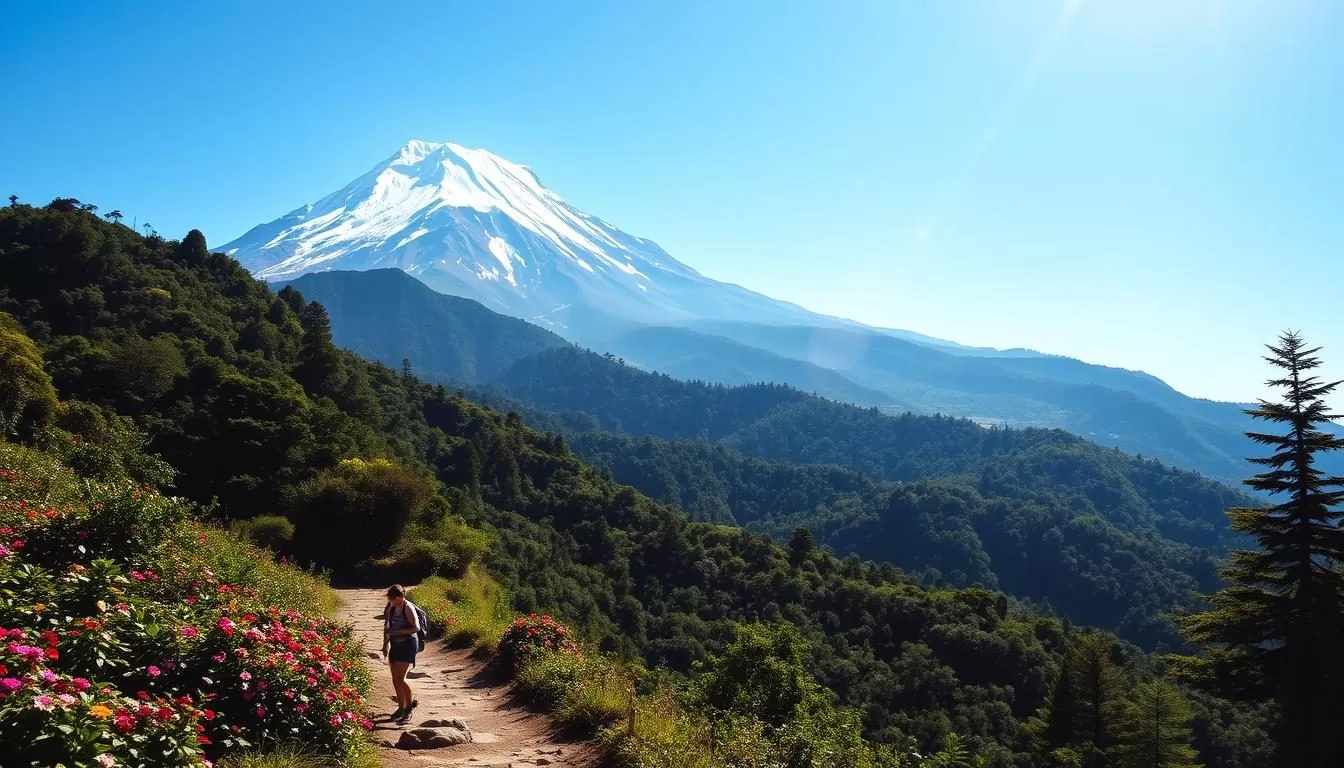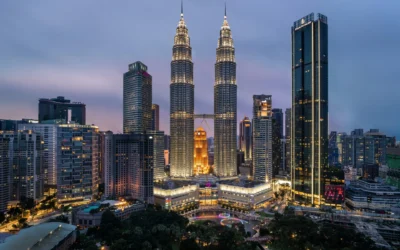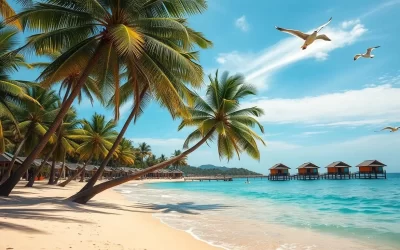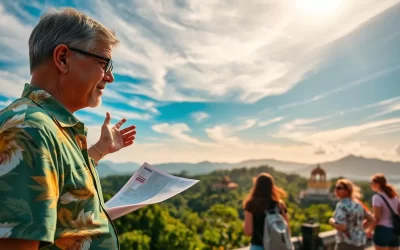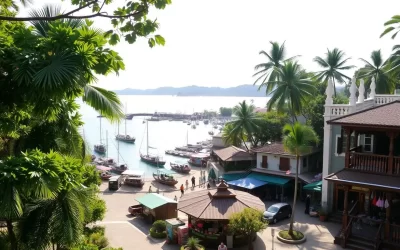✓ Accommodations✓ Flights✓ Rental Cars
Imagine standing at the summit of Mount Kinabalu, Malaysia’s highest peak, surrounded by breathtaking landscapes and an incredible array of flora and fauna. Located in the state of Sabah on the island of Borneo, this majestic mountain is easily accessible from Kota Kinabalu city, making it an ideal destination for travelers seeking adventure and relaxation.
As a UNESCO World Heritage Site, Mount Kinabalu offers a diverse range of activities for all types of visitors. From climbing to the summit to exploring botanical gardens, and from relaxing in hot springs to experiencing local culture, there’s something for everyone. The pleasant climate, with temperatures ranging from 15°C to 24°C, makes it a refreshing escape from Malaysia’s tropical heat.
You can enjoy a wealth of unforgettable experiences in this natural wonder of Malaysia. Whether you’re a casual nature lover or an adrenaline seeker, Mount Kinabalu is a must-visit destination that promises an adventure of a lifetime.
Discovering Mount Kinabalu: Malaysia’s Natural Wonder
You can’t help but be drawn to Mount Kinabalu, a mountain that embodies the essence of Malaysia’s natural heritage. As a significant landmark in Sabah, Malaysia, Mount Kinabalu is not just a mountain; it’s a cultural and ecological treasure that attracts visitors from around the world.
The Significance of Mount Kinabalu in Malaysian Culture
Mount Kinabalu holds a special place in the hearts of the indigenous Kadazan-Dusun people, who consider it a sacred site where the spirits of their ancestors reside. The name “Kinabalu” is derived from “Aki Nabalu,” meaning “revered place of the dead,” highlighting its deep cultural significance. This reverence is a testament to the mountain’s importance in Malaysian culture and history.
UNESCO World Heritage Status and Biodiversity
In 2000, Mount Kinabalu was recognized as Malaysia’s first UNESCO World Heritage Site, acknowledging its exceptional biodiversity and natural beauty. The Kinabalu National Park, covering 754 square kilometers, is home to over 4,500 species of flora and fauna, including more than 1,000 orchid species and the world’s largest pitcher plant, Nepenthes rajah. The park’s diverse ecosystems, ranging from lowland dipterocarp forests to subalpine vegetation, make it a unique biodiversity hotspot.
| Feature | Description | Significance |
|---|---|---|
| UNESCO World Heritage Site | Recognized in 2000 for its natural beauty and biodiversity | Acknowledges Malaysia’s rich ecological heritage |
| Biodiversity | Hosts over 4,500 species of flora and fauna | Makes it one of the world’s most significant biodiversity hotspots |
| Cultural Significance | Sacred to the indigenous Kadazan-Dusun people | Reflects the deep cultural and historical importance of Mount Kinabalu |
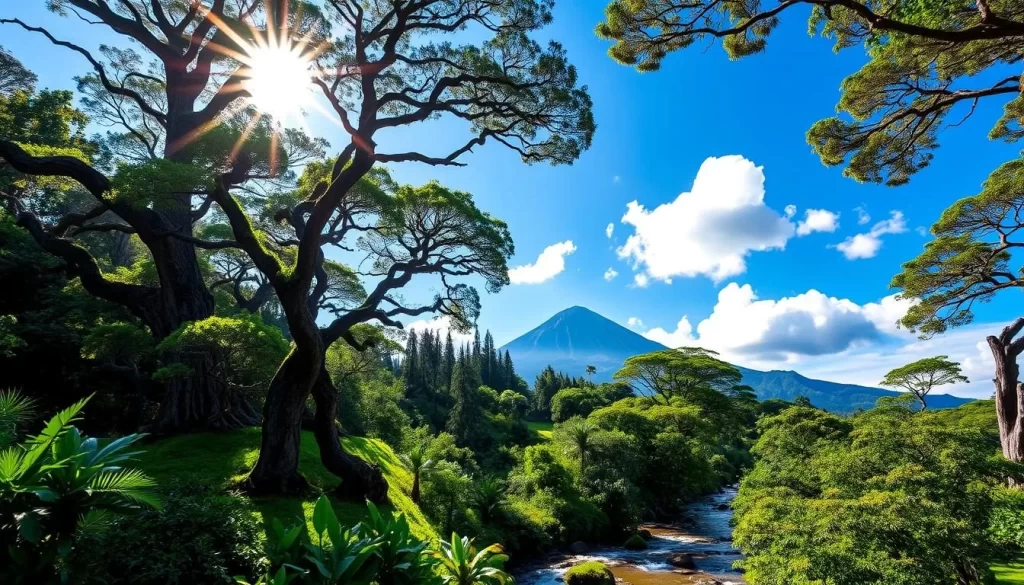
Planning Your Visit to Mount Kinabalu
Before you embark on your journey to Mount Kinabalu, it’s crucial to plan your visit. This ensures that you make the most of your trip and enjoy the natural beauty that Malaysia has to offer.
Best Time to Visit Mount Kinabalu
The best time to visit Mount Kinabalu is during the dry season, from March to October, when the weather is favorable for outdoor activities and photography. April and September are particularly good months as they offer a balance between good weather and smaller crowds.
Getting to Kinabalu Park
Kinabalu Park is located approximately 89 kilometers from Kota Kinabalu city, a journey of about two hours by car. You can rent a car for the most flexible travel option or take a minibus from Kota Kinabalu’s Padang Merdeka Field for about RM20 one way. Alternatively, consider booking a guided tour that includes hotel pickup.
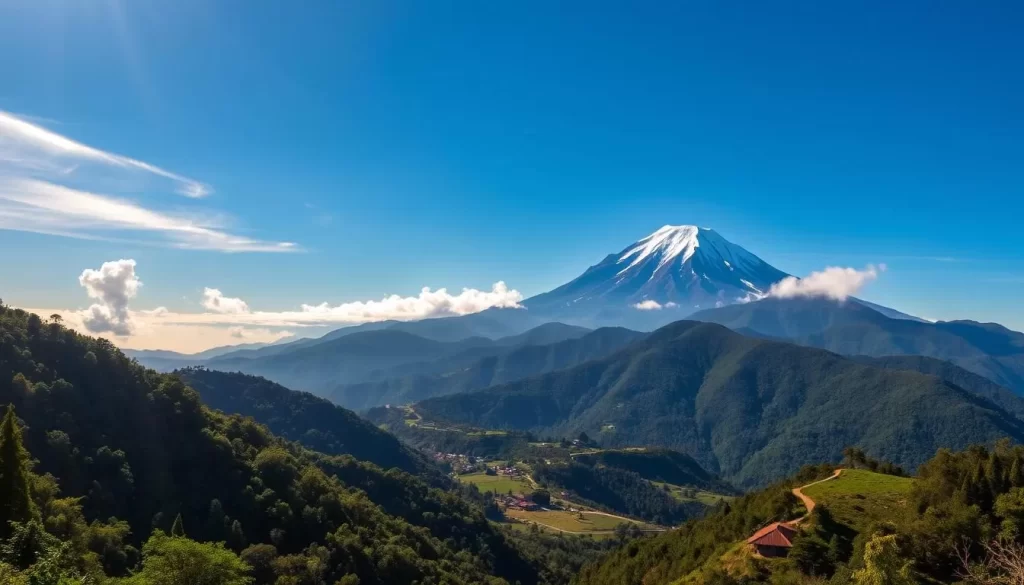
Entrance Fees and Conservation Efforts
The park is open daily from 7 AM to 7 PM. Entrance fees are as follows: RM50 for non-Malaysian adults and RM25 for children under 18. Your ticket can be reused on the same day at Poring Hot Springs. A portion of the entrance fees supports conservation efforts aimed at preserving the park’s unique biodiversity.
- Plan your visit during the dry season for optimal conditions.
- Consider renting a car or booking a guided tour for convenience.
- Take advantage of the reusable entrance ticket for visiting Poring Hot Springs.
Climbing Mount Kinabalu: The Ultimate Adventure
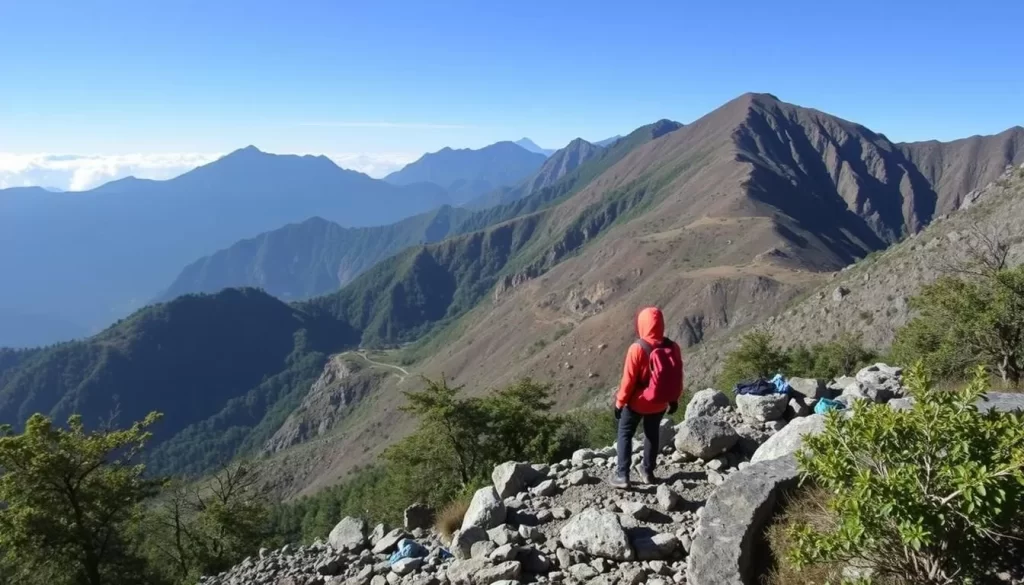
Embark on the adventure of a lifetime by climbing Mount Kinabalu, Malaysia’s highest peak. This granite mountain attracts over 45,000 tourists annually, drawn to its challenging climb and breathtaking scenery.
Climbing Routes and Difficulty Levels
The Summit Trail is the most popular route, taking climbers through diverse ecosystems from lush rainforest to rocky alpine terrain before reaching Low’s Peak at 4,095.2 meters. For those seeking an additional challenge, the Via Ferrata offers a thrilling option at 3,200-3,800 meters above sea level.
Booking Your Climb in Advance
Advance booking is essential, with climbs often filling up six months ahead, especially during peak season (April to August). It’s crucial to plan ahead to secure your spot on this incredible adventure.
Essential Gear and Preparation Tips
Essential gear includes sturdy hiking boots, warm and waterproof clothing, a headlamp for the pre-dawn summit climb, and plenty of water. A reasonable level of fitness is required, and all climbers must be accompanied by licensed mountain guides.
With proper preparation and the right mindset, climbing Mount Kinabalu can be a truly unforgettable experience, offering a sense of accomplishment and breathtaking views from the peak.
Mount Kinabalu, Malaysia: Best Things to Do – Top Picks
The area around Mount Kinabalu offers a variety of experiences that cater to different interests. You can enjoy breathtaking sunsets, explore the rainforest canopy, or witness the rare Rafflesia flower in bloom.
Watching the Famous Sabah Sunset
Watching the sunset in Sabah is a must-do experience. The sky transforms into stunning hues of orange, pink, and gold as the sun descends behind Mount Kinabalu. Some of the best sunset viewing spots include Kundasang for mountain views, Tanjung Aru Beach, and Signal Hill Observatory Tower in Kota Kinabalu city.
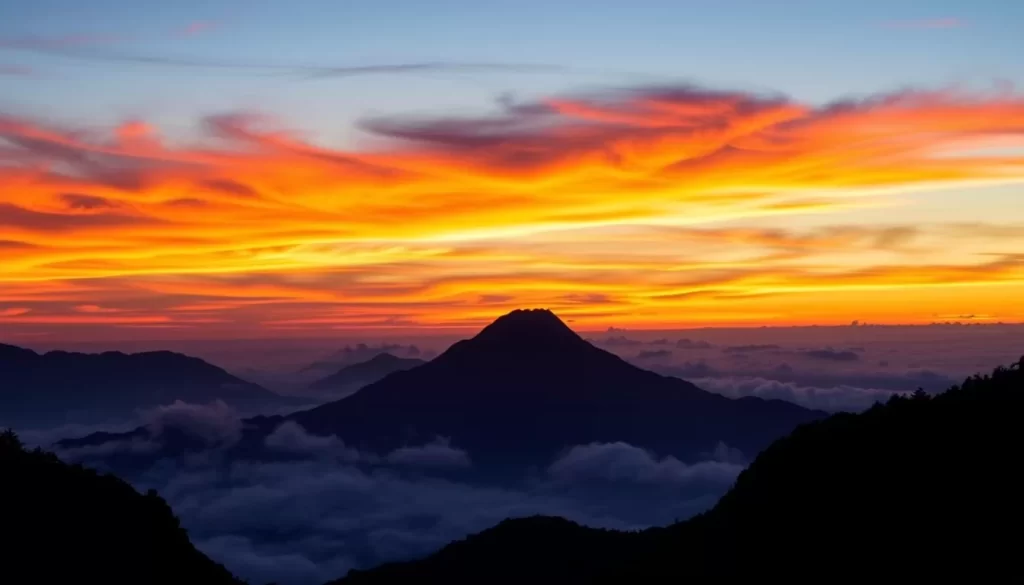
Exploring the Canopy Walkway
Exploring the canopy walkway offers a unique perspective of the rainforest, allowing you to observe the rich biodiversity from 40 meters above the ground among the treetops. The canopy walkway in Poring gives you the chance to spot wildlife that dwells in the upper forest layers.
Visiting the Rafflesia Flower
Visiting the rare Rafflesia flower is a special experience that requires good timing and a bit of luck. These giant blooms only appear for 5-7 days, and local guides often know the best spots to find them. Roadside banners near Poring Hot Springs announce when and where these rare blooms can be viewed.
These top activities showcase the natural wonders that make Mount Kinabalu and its surroundings a world-class destination for nature lovers and photographers. When planning your tour to Kota Kinabalu, make sure to include these things to do.
Exploring Kinabalu Park’s Nature Trails
With nine well-maintained nature trails, Kinabalu Park is a hiker’s paradise, offering something for everyone. The trails cater to different fitness levels and interests, allowing you to experience the park’s rich biodiversity.
Silau-Silau and Liwagu Trails
The Silau-Silau Trail is ideal for casual walkers, offering a gentle path through lush forest with opportunities to spot wildlife and interesting plants. For more ambitious hikers, the Liwagu Trail extends 5.5 km one way and rewards trekkers with spectacular views and a greater chance of wildlife encounters.
Wildlife and Plant Species to Spot
These trails showcase the park’s incredible biodiversity, with opportunities to spot mountain squirrels, colorful birds, and fascinating insects. Plant enthusiasts will be delighted by the variety of flora, including the pink Kinabalu Balsam and numerous orchid species.
| Trail Name | Distance | Features |
|---|---|---|
| Silau-Silau Trail | Variable | Lush forest, wildlife |
| Liwagu Trail | 5.5 km one way | Spectacular views, wildlife encounters |
| Bundu Tuhan View Trail | 224 meters one way | Short, scenic view |

Early morning is the best time for wildlife spotting on these trails, when animals are most active. Hiring a knowledgeable guide can enhance your jungle trekking experience, as they can identify wildlife and explain the ecological significance of various species.
Mount Kinabalu Botanical Garden Experience
Tucked away behind the Liwagu Restaurant, the Mount Kinabalu Botanical Garden is a hidden gem that showcases the rich biodiversity of Kinabalu Park. This garden is a great place to experience the natural beauty of the park in a short visit.
Rare and Endemic Plant Species
The garden houses a representative collection of plants, flowers, and herbs from Kinabalu Park, including rare species like the Rothschild Slipper Orchid and Nepenthes rajah. Nepenthes rajah, the world’s largest pitcher plant, can hold up to 3.5 liters of water and occasionally traps small rodents. The garden is home to many endemic species that are found nowhere else on Earth.
Guided Tours and Educational Opportunities
The Mount Kinabalu Botanical Garden offers daily guided tours at 9 AM, 12 PM, and 3 PM for a small fee. The knowledgeable guides share interesting stories about the plants and their unique adaptations. You can learn about the ecological significance of various plants and their traditional uses by local communities.
For a day trip to Kinabalu Park, visiting the botanical garden is one of the things to do that provides a comprehensive experience with the help of a guide on a tours.
Relaxing at Poring Hot Springs

After conquering Mount Kinabalu, unwind at Poring Hot Springs, a serene oasis located within Kinabalu Park. About 40 km from Kinabalu Park Headquarters, Poring Hot Springs offers a perfect blend of relaxation and adventure.
Therapeutic Sulphur Baths
The naturally occurring sulphur-rich hot springs at Poring are channeled into concrete tubs of varying temperatures, allowing you to soak away muscle aches and fatigue. These therapeutic baths have been popular since the Japanese occupation during World War II, when they were first developed for relaxation and health benefits.
Canopy Walkway Adventure
Experience the thrill of walking on the 40-meter-high canopy walkway, which spans 175 meters across several suspension bridges. This unique adventure gives you a chance to observe birds, insects, and plant life thriving in the upper forest layers.
Poring Hot Springs is an economical addition to your itinerary since your Kinabalu Park entrance ticket can be reused on the same day. You can also rent private bathtubs for a more secluded experience.
Adventure Activities Around Mount Kinabalu
Beyond the majestic Mount Kinabalu, the region is ripe with adventure activities waiting to be explored. You can experience the thrill of various adventures that cater to different interests and adrenaline levels.
Via Ferrata Experience on Mount Kinabalu
The Via Ferrata experience on Mount Kinabalu is an unparalleled adventure that lets you traverse the mountain face using fixed cables, ladders, and bridges at elevations between 3,200 and 3,800 meters. Run by Mountain TORQ, it’s the world’s highest and Asia’s first Via Ferrata, offering spectacular views and an adrenaline rush.

White Water Rafting at Kiulu River
Located about 1.5 hours from Kota Kinabalu, Kiulu River offers an exciting white water rafting experience suitable for all ages. The 15km rafting route is the longest in Borneo, surrounded by lush jungle scenery and traditional villages.

Paragliding in Lohan
For a bird’s-eye view of the magnificent landscape, paragliding in Lohan provides a thrilling 5-7 minute tandem flight experience. You’ll soar above the rolling hills and valleys, enjoying an unforgettable adventure for around RM200.

These adventure activities can be combined with your Mount Kinabalu visit, allowing you to experience the region’s natural beauty from different perspectives. Tour operators in Kota Kinabalu can arrange packages that include transportation, equipment, and guides, making these adventures accessible.
Cultural Experiences Near Mount Kinabalu
Uncover the traditions and customs of Sabah’s indigenous people at the Mari Mari Cultural Village and enjoy the local flavors at the Gaya Street Sunday Market.
Mari Mari Cultural Village Visit
The Mari Mari Cultural Village, located about 30 minutes from Kota Kinabalu, offers an immersive experience into the traditions and lifestyles of five different ethnic tribes of Sabah.
Through interactive demonstrations, you’ll learn about traditional practices such as fire-starting without matches, blowpipe hunting, tattoo-making, and rice wine production.
The village showcases cultural performances, including traditional dances and music, while guided tours through reconstructed traditional homes provide insight into the architectural styles and daily lives of Borneo’s indigenous people.
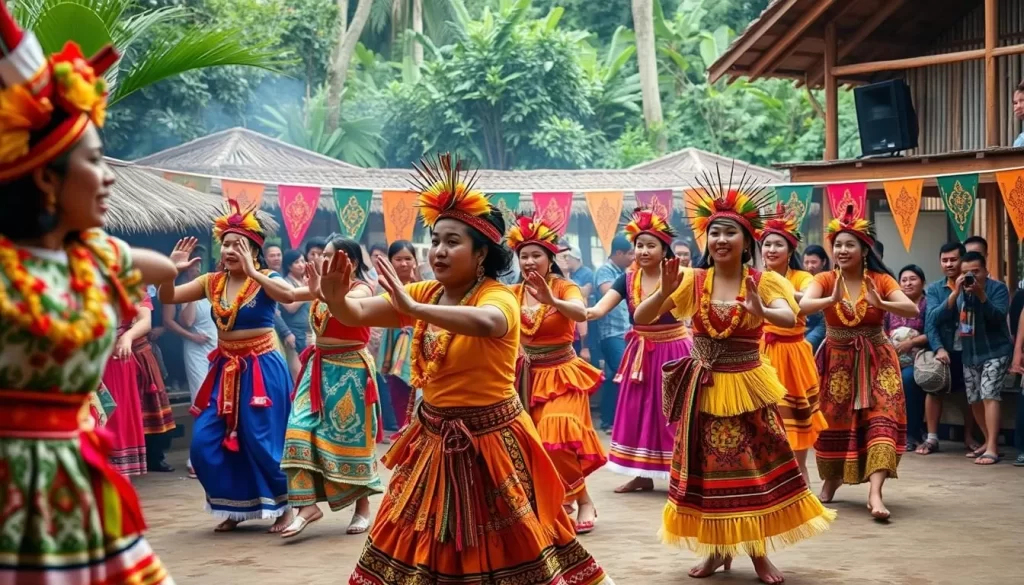
Gaya Street Sunday Market
For a different cultural experience, the Gaya Street Sunday Market in downtown Kota Kinabalu transforms the city’s main thoroughfare into a vibrant bazaar every Sunday morning.
This weekly market has been a tradition for over 100 years and features everything from handcrafted souvenirs and local artwork to fresh produce, street food, and even pet supplies.
The Gaya Street Sunday Market is an excellent place to practice your bargaining skills while picking up unique souvenirs like pearls from the Sulu Sea, handwoven textiles, or local spices and coffee.

Day Trips from Mount Kinabalu
Day trips from Mount Kinabalu offer a great opportunity to see more of Sabah’s natural beauty and history. You can visit nearby attractions that showcase the region’s diverse landscapes and cultural heritage.
DESA Cattle Farm in Mesilau
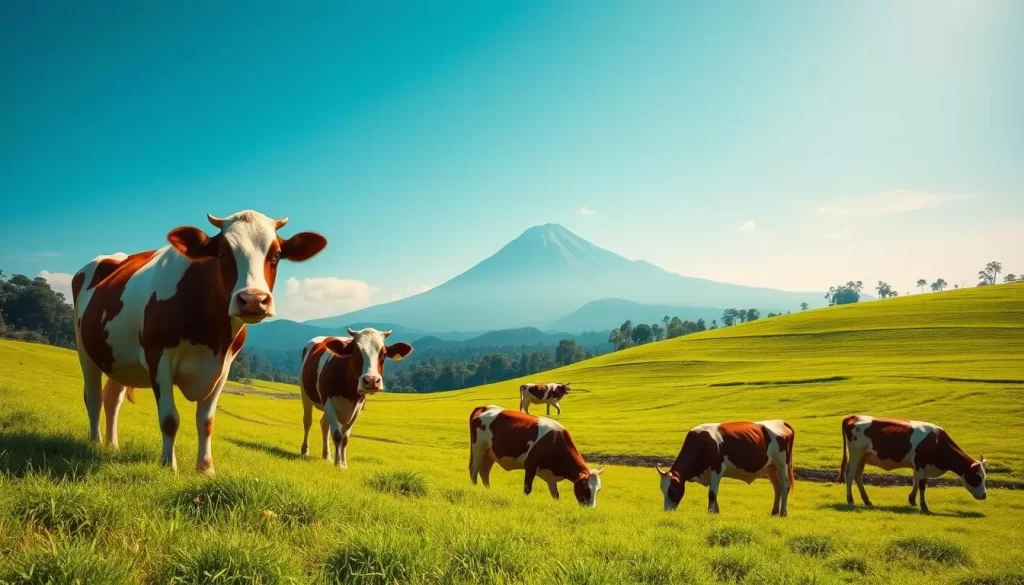
The DESA Cattle Farm in Mesilau is a family-friendly destination that offers a unique experience. You can see milk cows feeding on green pastures under the majestic Mount Kinabalu, reminiscent of New Zealand’s landscapes. The farm is a producer of Sabah cow and goat milk, and you can try their gelato or yogurt ice cream, as well as visit the milking station. Interact with the cute baby cows and little lambs by hand-feeding them at the barn.
Kundasang War Memorial
The Kundasang War Memorial is a poignant historical site that commemorates the 2,428 Australian and British prisoners of war who died during the infamous Sandakan Death March of World War II. The memorial features four beautiful gardens: the Australian Garden, English Rose Garden, Borneo Garden, and Contemplation Garden, each honoring different aspects of this solemn history.
Nabalu Town Market
Nabalu Town Market, located about 12 km before reaching Kinabalu Park, is a popular rest stop where you can stretch your legs and enjoy panoramic views of Mount Kinabalu. The market offers a wide selection of local handicrafts, souvenirs, fresh fruits, and vegetables, making it an excellent place to sample exotic fruits or pick up authentic local products.
These day trips can be easily combined with your Mount Kinabalu visit, allowing you to experience the diverse attractions of the region without having to return to Kota Kinabalu city.
Island Hopping and Marine Experiences

The Tunku Abdul Rahman Marine Park is a gem of Kota Kinabalu, featuring five beautiful islands that promise an exciting island-hopping experience. Just a 20-minute boat ride from Kota Kinabalu, this marine park offers a perfect blend of relaxation and adventure.
Tunku Abdul Rahman Marine Park
The park comprises five stunning islands: Manukan, Sapi, Gaya, Sulug, and Mamutik. Each island boasts its unique charm, making island hopping a must-do activity. Manukan Island, the second largest, is well-developed with facilities like restaurants and accommodations, ideal for day trips or overnight stays. Sapi Island, on the other hand, is known for its white sandy beaches and the thrilling Coral Flyer zipline that connects it to Gaya Island.
Snorkeling and Diving Opportunities
The waters surrounding the islands are teeming with vibrant coral reefs and diverse marine life, making it a paradise for snorkeling and diving enthusiasts. The marine park provides excellent snorkeling opportunities, with coral gardens and marine life accessible even to beginners. For certified divers, the waters offer dive sites suitable for all experience levels, with the chance to spot reef sharks, turtles, and a variety of tropical fish. Many tour operators in Kota Kinabalu offer combined packages that include transportation, equipment rental, and guide services, making it easy to plan a tour or trip to the marine park.
Whether you’re looking to relax on the serene beaches of Gaya Island or explore the underwater world, Tunku Abdul Rahman Marine Park has something for everyone. The contrast between the cool mountain climate of Kinabalu and the warm tropical waters of the marine park creates a perfect balance for travelers seeking diverse natural experiences in Sabah.
Where to Stay Around Mount Kinabalu

As you prepare for your Mount Kinabalu adventure, it’s essential to explore the various accommodation options available. Staying overnight near Mount Kinabalu allows you to fully experience the area without rushing, giving you time to enjoy early morning activities when wildlife is most active and crowds are thinner.
Accommodation Inside Kinabalu Park
The accommodation inside Kinabalu Park Headquarter is managed by Sutera Sanctuary Lodges, offering options ranging from budget-friendly hostels (starting at RM125) to luxurious lodges (up to RM14,400 for the Rajah Lodge). Staying within the park provides the convenience of early access to trails, the botanical garden, and a head start for climbers, plus the unique experience of spending the night in a UNESCO World Heritage Site.
Nearby Hotels and Resorts in Kundasang
For those seeking more affordable options, the areas of Kundasang and Ranau just outside the park boundaries offer numerous guesthouses, hotels, and resorts at lower prices than within the park. Many of these external accommodations actually provide better views of Mount Kinabalu than those inside the park, with properties like Kinabalu Pine Resort offering stunning panoramas from their rooms and restaurants.
Culinary Delights: What to Eat Around Mount Kinabalu
The area around Mount Kinabalu is a foodie’s paradise, offering a diverse range of local cuisine that reflects the rich cultural heritage of Sabah. As you explore the region, you’ll have the opportunity to try various traditional dishes and fresh seafood.
Local Sabahan Cuisine
Local Sabahan cuisine is a unique blend of indigenous traditions with influences from Chinese, Malay, and Filipino cooking. Be sure to try hinava, a refreshing ceviche-like dish made with raw fish, lime, and spices. You might also encounter butod, sago worms considered a delicacy among indigenous people.
Best Restaurants and Food Spots
For an authentic dining experience, visit the night markets in Kundasang and Ranau, where you can sample multiple local dishes. Restaurants like Liwagu Restaurant and Balsam Cafe inside Kinabalu Park serve both Western and Asian cuisine. For a more economical option, try family-run restaurants in Kundasang town, offering home-cooked Sabahan meals with spectacular views.
| Dish | Description | Location |
|---|---|---|
| Hinava | Ceviche-like dish made with raw fish | Night Markets |
| Tuaran Mee | Noodle dish fried with egg and vegetables | Local Restaurants |
| Cendol | Sweet dessert made from shaved ice and coconut milk | Street Food Stalls |
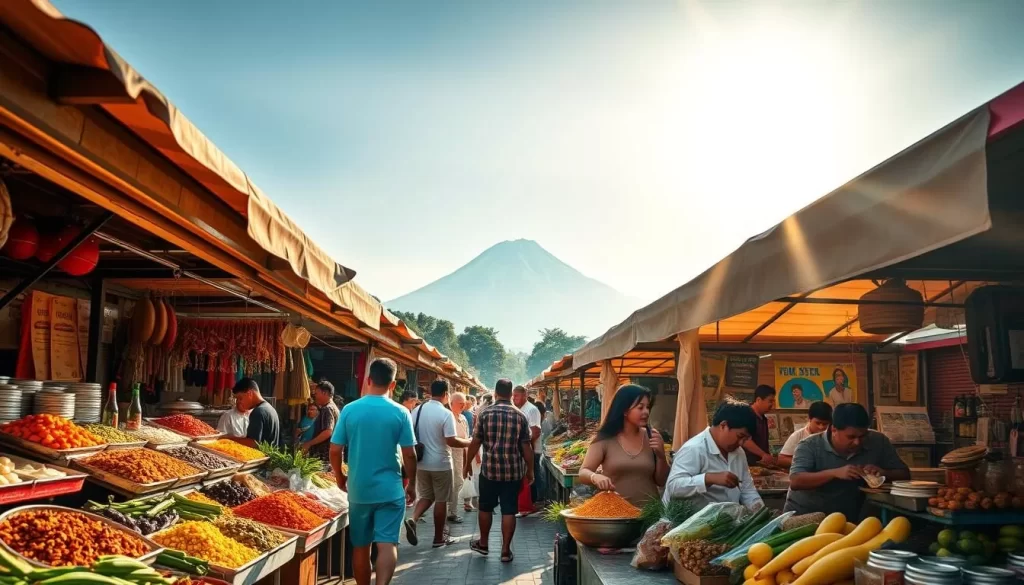
Conclusion: Making the Most of Your Mount Kinabalu Adventure
Mount Kinabalu is more than just a mountain; it’s an adventure that encompasses a wide range of experiences, from thrilling activities to serene natural beauty. To truly make the most of your trip, consider allocating at least 3-4 days to explore the area without rushing.
A balanced itinerary is key; mix active adventures like climbing or jungle trekking with more relaxing experiences such as visiting the hot springs or botanical garden. Don’t overlook the cultural and historical dimensions of the region, which add depth to your natural experiences.
Be prepared for changing weather conditions and support conservation efforts by respecting park rules. Hiring local guides can enhance your experience, providing insights into the ecology and culture. Whether you reach the summit or enjoy the lower slopes, Mount Kinabalu’s majestic presence makes it a rewarding destination. Your memories of this trip will linger long after you leave.
The above is subject to change.
Check back often to TRAVEL.COM for the latest travel tips and deals.
